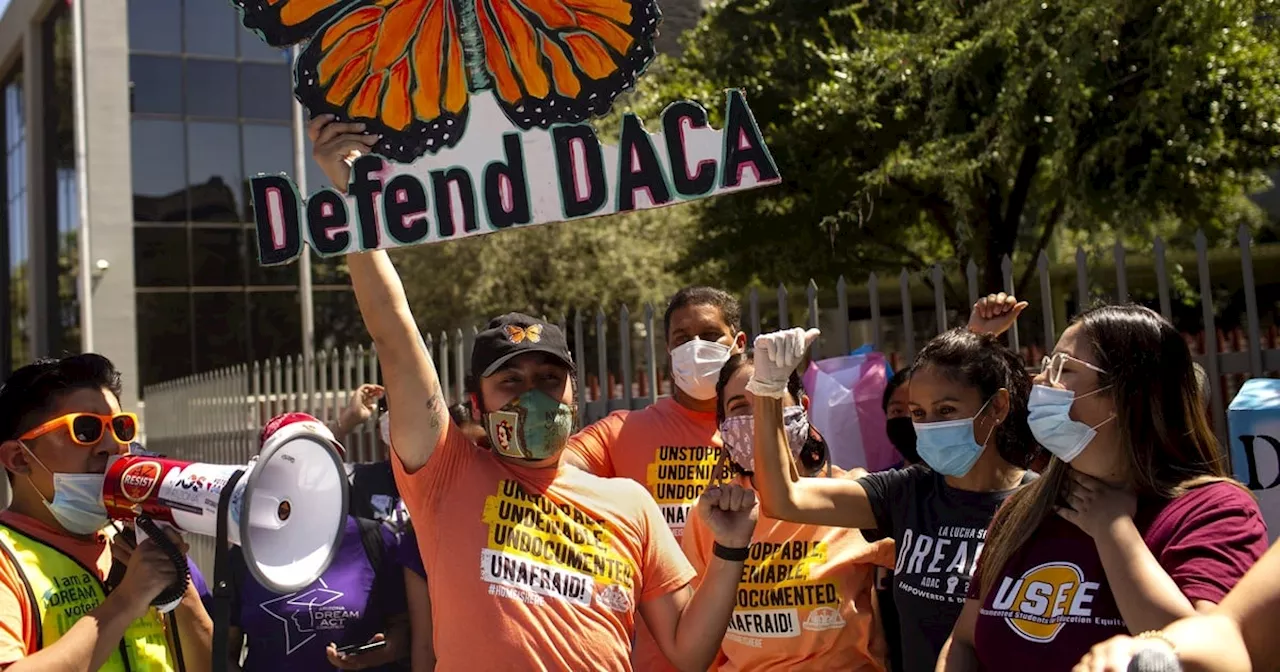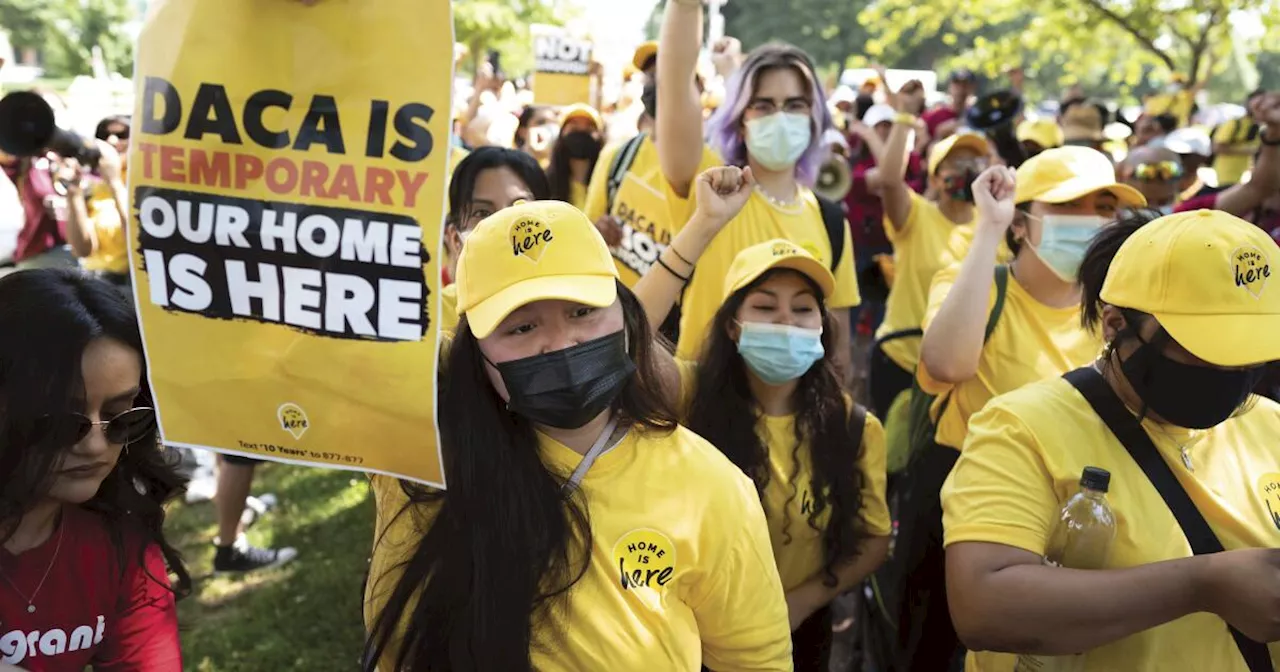A federal appeals court has dealt a blow to the Deferred Action for Childhood Arrivals (DACA) program, blocking the government from accepting new applications. The ruling, while not immediately impacting the over 500,000 current beneficiaries who can renew their permits, raises concerns about the future of the program established by President Obama to protect immigrants brought to the U.S. illegally as children.
A federal appeals court on Friday ruled against an Obama -era policy to shield immigrants who came to the country illegally as young children, just three days before Donald Trump takes office with pledges of mass deportations. The unanimous decision by a panel of the 5th U.S. Circuit Court of Appeals in New Orleans — two judges appointed by Republican presidents, Ronald Reagan and George W.
Bush, and one by Democrat Barack Obama — marks the latest setback for the Deferred Action for Childhood Arrivals program, whose beneficiaries have lived in legal limbo for more than a decade. It signals no immediate change for its more than 500,000 beneficiaries, who can renew temporary permits to live and work in the United States. However, the federal government can no longer accept new applications, leaving an aging and dwindling pool of recipients. The decision could set the stage for the policy to be revisited by the Supreme Court for a third time. Trump sought to terminate DACA during his first term but also occasionally expressed a desire for beneficiaries to remain in the country. Obama introduced DACA in 2012, citing Congress' inaction on legislation aimed at providing those brought to the U.S. as children a pathway to legal status. Legal battles ensued, including two trips to the Supreme Court. This latest case revolves around a revised version of the rule issued by President Biden in 2022. While it represented minimal substantive changes from the 2012 memo that established DACA, it underwent public comment as part of a formal rule-making process designed to enhance its legal standing. U.S. District Judge Andrew Hanen in Houston ruled that the executive branch had overstepped its authority and prohibited the government from approving new applications. He maintained the program intact for current beneficiaries while appeals progressed through the courts. Texas Attorney General Ken Paxton, who spearheaded the challenge on behalf of Republican-led states, hailed Friday's ruling as “a major victory.” “I look forward to working with President-elect Donald Trump to ensure that the rule of law is restored, and the illegal immigration crisis is finally stopped,” Paxton stated. The U.S. Homeland Security Department did not immediately respond to a request for comment. In 2016, with a vacancy on the Supreme Court, the justices deadlocked 4-4 on an expanded DACA and a version of the program for parents of DACA recipients, upholding a lower court decision to block the benefits. In 2020, the high court ruled 5-4 that the Trump administration had improperly ended DACA by failing to adhere to federal procedures, allowing it to remain in effect.
Immigration DACA Deferred Action For Childhood Arrivals Obama Trump Immigration Appeals Court Supreme Court Legal Challenge Biden
United States Latest News, United States Headlines
Similar News:You can also read news stories similar to this one that we have collected from other news sources.
 Appeals Court Rejects Obama-Era DACA PolicyA federal appeals court ruled against an Obama-era policy that protected immigrants brought to the U.S. illegally as children, dealing a setback to the Deferred Action for Childhood Arrivals program. While the decision doesn't immediately affect current beneficiaries, the inability to accept new applications raises concerns about the program's future.
Appeals Court Rejects Obama-Era DACA PolicyA federal appeals court ruled against an Obama-era policy that protected immigrants brought to the U.S. illegally as children, dealing a setback to the Deferred Action for Childhood Arrivals program. While the decision doesn't immediately affect current beneficiaries, the inability to accept new applications raises concerns about the program's future.
Read more »
 Appeals court rules DACA, Obama-era immigration policy, is unlawfulTexas Attorney General Ken Paxton, who led the challenge on behalf of Republican-led states, called the ruling 'a major victory'
Appeals court rules DACA, Obama-era immigration policy, is unlawfulTexas Attorney General Ken Paxton, who led the challenge on behalf of Republican-led states, called the ruling 'a major victory'
Read more »
 Appeals Court Rules Against DACA, Setting Up Potential Supreme Court ShowdownA federal appeals court dealt a blow to the Deferred Action for Childhood Arrivals (DACA) program, ruling against an Obama-era policy that shielded young immigrants who arrived in the U.S. illegally as children. The decision, which bars the federal government from accepting new DACA applications, could lead to another Supreme Court battle over the program's future.
Appeals Court Rules Against DACA, Setting Up Potential Supreme Court ShowdownA federal appeals court dealt a blow to the Deferred Action for Childhood Arrivals (DACA) program, ruling against an Obama-era policy that shielded young immigrants who arrived in the U.S. illegally as children. The decision, which bars the federal government from accepting new DACA applications, could lead to another Supreme Court battle over the program's future.
Read more »
 Federal Appeals Court Rules DACA Unlawful, Raising Concerns for 'Dreamers'A federal appeals court has declared the Deferred Action for Childhood Arrivals (DACA) immigration policy unlawful, casting a shadow of uncertainty over the future of hundreds of thousands of 'Dreamers' brought to the U.S. as children. The ruling, while partially stayed, could ultimately lead to the Supreme Court deciding the fate of this long-debated program. The Biden administration's efforts to codify DACA were deemed to violate U.S. immigration law, with the court focusing its impact on Texas, the state leading the legal challenge against DACA. The ruling's implications for current DACA beneficiaries remain unclear, pending further court decisions.
Federal Appeals Court Rules DACA Unlawful, Raising Concerns for 'Dreamers'A federal appeals court has declared the Deferred Action for Childhood Arrivals (DACA) immigration policy unlawful, casting a shadow of uncertainty over the future of hundreds of thousands of 'Dreamers' brought to the U.S. as children. The ruling, while partially stayed, could ultimately lead to the Supreme Court deciding the fate of this long-debated program. The Biden administration's efforts to codify DACA were deemed to violate U.S. immigration law, with the court focusing its impact on Texas, the state leading the legal challenge against DACA. The ruling's implications for current DACA beneficiaries remain unclear, pending further court decisions.
Read more »
 Federal Appeals Court Rules Against DACAA federal appeals court has ruled against the Deferred Action for Childhood Arrivals (DACA) program, an Obama-era policy that shielded immigrants who arrived in the US illegally as children. The decision, which marks the latest setback for DACA, prohibits the federal government from accepting new applications while current beneficiaries can renew their permits. While the ruling does not immediately change the status of DACA recipients, it raises concerns about the program's future and its vulnerability to further legal challenges.
Federal Appeals Court Rules Against DACAA federal appeals court has ruled against the Deferred Action for Childhood Arrivals (DACA) program, an Obama-era policy that shielded immigrants who arrived in the US illegally as children. The decision, which marks the latest setback for DACA, prohibits the federal government from accepting new applications while current beneficiaries can renew their permits. While the ruling does not immediately change the status of DACA recipients, it raises concerns about the program's future and its vulnerability to further legal challenges.
Read more »
 Federal Appeals Court Rules Against DACAA federal appeals court has ruled against DACA, an Obama-era policy that protects immigrants brought to the U.S. illegally as children. The decision, while not immediately changing the status of current beneficiaries, blocks new applications and raises concerns about the program's future. The ruling could lead to a third Supreme Court case on DACA.
Federal Appeals Court Rules Against DACAA federal appeals court has ruled against DACA, an Obama-era policy that protects immigrants brought to the U.S. illegally as children. The decision, while not immediately changing the status of current beneficiaries, blocks new applications and raises concerns about the program's future. The ruling could lead to a third Supreme Court case on DACA.
Read more »
